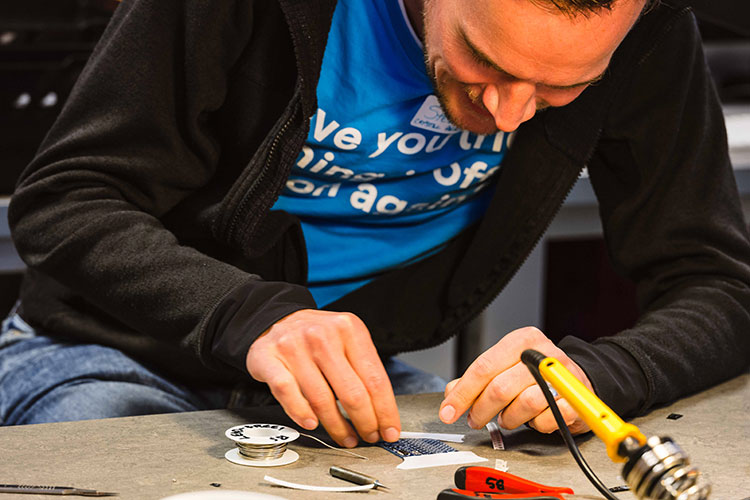This year Recycle Week runs from 21 to 27 September and is thanking the UK for continuing to recycle despite the challenges presented by the global COVID-19 pandemic.
To celebrate the organisations and individuals in the recycling sector who have continued to work hard despite the unprecedented difficulties encountered this year, this week we are publishing a new industry insight Q&A every day with those who are really making a difference.
We have already featured Bristol Waste Company, iWaste and Indigo Environmental, and whilst not strictly recycling, we also wanted to take this opportunity to shine a light on the leading lights of reuse. Here is James Pickstone, Online community lead from The Restart Project, to tell us more about the challenges of keeping electronic devices in useful circulation.
Who are The Restart Project and what do you do?
 The Restart Project is a people-powered charity and social enterprise that works to fix our broken relationship with electronics. We’re consuming too much, too quickly and feeling frustrated. In the process, we’re feeding huge piles of electronic waste and driving industrial processes that damage the environment and communities all over the world.
The Restart Project is a people-powered charity and social enterprise that works to fix our broken relationship with electronics. We’re consuming too much, too quickly and feeling frustrated. In the process, we’re feeding huge piles of electronic waste and driving industrial processes that damage the environment and communities all over the world.
The Restart Project is trying to fix this by helping everyone value and use their electronics for longer by repairing them when they break. We help communities run local repair events where people can work with skilled volunteers to give their broken or slow electronic devices a second life, from tablets to toasters, from iPhones to headphones. We collect and analyse repair data from these events to help inform policymakers and campaign for the Right to Repair.
By bringing people together to share skills and gain the confidence to open up their stuff, we give people a hands-on way of making a difference, as well as a way to talk about the wider issue of what kind of products we want. We use this data and the stories we collect to help demand better, more sustainable electronics for all.
For your organisation, what have been the biggest challenges in the last six months?
Much of our work revolves around running or supporting community repair events, which have all had to be suspended due to the pandemic. For many people, these events are their primary access to repair and an important social touchstone. We’ve been working with many communities on ways to facilitate repair and keep people connected online.
"Many repair businesses have been struggling too, so we’ve been working on ways to leverage our network to raise their profile."
This includes signposting repair businesses which were still operating during lockdown and subsequently expanding our London-focused repair directory.
Has the ‘new normal’ presented any unforeseen opportunities for you?
We’ve always encouraged people to repair their broken stuff instead of throwing it away. Everyone’s intense focus on digital technologies over the last six months has allowed us to pilot new formats of repair-focused events online, from educational workshops to an online conference.
"The pandemic has also brought into focus how many people are digitally excluded."
To help this, we’ve been proud to support and publicise a number of computer reuse projects around the UK. These projects collect, refurbish or repair and then donate devices to families and schools without the means to participate in digital activities, such as schooling.
What does the future look like for your industry and what challenges lie ahead?
One thing that’s obvious is that the pandemic is helping us realise how essential repair is, especially at times when it might be hard to even replace a broken device with a new one. This is why alongside partners we’ve decided to dedicate the fourth edition of International Repair Day, on 17 October, to “repair is essential”.

Uncertainty about Covid-19 means that most UK community repair groups won’t be able to resume their activities for months to come. This causes a real challenge, as for many small electrical products seen at repair events, there are no commercial repair options.
Another challenge is the future of product policy. As the UK leaves the EU, we don’t know whether the government will develop regulation to promote waste prevention, by focusing on product longevity and repairability. We will continue to demand the right to repair, as we’ve done with our Manchester Declaration.
What one piece of advice to improve recycling would you tell consumers today?
Don’t want it or need it anymore? Before recycling, always consider reuse: donating or reselling your old electrical or electronic product. But don’t sit on it: electronics don’t always age well, it’s best to keep them in circulation.
"Is it broken? There’s a good chance it can be fixed. Repair is usually cheaper and almost always greener than buying a new one."
And what advice would you give policy makers?
It needs to be easy to do the right thing; consistency and education are key, including promoting reuse and repair as ways to prevent unnecessary waste in the first place. We’d also love to see more transparency about what actually happens to our recycling after it’s put in the appropriate bin.
Tell us your favourite fact or myth to bust about recycling
Recycling is a fantastic way to keep materials in use for as long as possible and reduce the need to extract more. But it’s easy to forget that recycling is already half way down the waste hierarchy, below reduction, reuse and repair. All are vital to meet our environmental responsibility.

Ben Luger
Marketing projects specialist
Ben joined the team at the beginning of 2015 and helps drive marketing communications and projects for Ecosurety, including project managing the launch of the Ecosurety Exploration Fund and website content development.

Latest News

Q2 2024 recycling data shows strong performance in H1
By Sam Marshall 24 Jul 2024
Ecosurety continue to step up for refill and reuse
By Victoria Baker 24 Jun 2024
Ecosurety renews B Corp™ certification with flying colours
By Louise Shellard 11 Jun 2024
Ecosurety sponsor the 2024 Carbon Literate Organisation Awards
By Louise Shellard 07 Jun 2024
